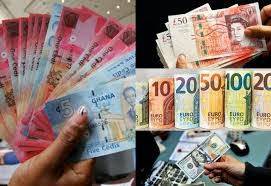International economic research firm Fitch Solutions has revised its end-of-year forecast for the Ghanaian cedi, predicting a marked strengthening of the local currency against the US dollar. The new projection places the exchange rate at GHS13.0 to 1 USD, a notable improvement from the earlier estimate of GHS15.5.
This upward
revision follows a remarkable 30% appreciation of the cedi between late April
and May 2025, driven predominantly by soaring global gold prices—an indicator
of Ghana’s vital mineral exports fueling the currency’s resilience. Fitch
anticipates this momentum to continue, with the cedi appreciating by 12.9% in
2025, compared to its end-2024 level of GHS14.7/USD.
The
strengthening currency is expected to have a positive impact on inflation by
reducing the cost of imported goods crucial for Ghana, which imports fuel,
cereals, pharmaceuticals, and plastics. With the cedi gaining ground, Fitch
forecasts a decrease in headline inflation from 21.5% in April to an average of
18.0% for the year, ultimately closing at 13.1%, closer to pre-pandemic levels
of around 12.4%.
This
anticipated easing in inflation, coupled with the currency appreciation, could
provide the Bank of Ghana (BoG) with the flexibility to ease monetary policy.
Fitch predicts a 200 basis point cut in the policy rate in the second half of
2025, lowering it from 28.00% to 26.00% by year-end—signaling confidence in the
country’s economic stabilization.
Meanwhile, the Governor of the Bank of Ghana, Dr. Johnson Asiama, has rejected claims that the central bank is targeting a specific level for the cedi’s appreciation. He emphasized that the Bank’s exchange rate strategy is aimed at reducing excessive volatility, not fixing exchange rate thresholds.
As Ghana’s
economy continues to recover, analysts see the currency’s strength as a sign of
growing confidence, which could translate into more stable prices and increased
household spending power. The combination of currency appreciation, moderating
inflation, and potential monetary easing paints a cautiously optimistic picture
for the Ghanaian economy in the second half of 2025.
Meanwhile,
businesses and consumers alike await further developments, hopeful that these
positive trends will translate into sustained economic growth and stability.



